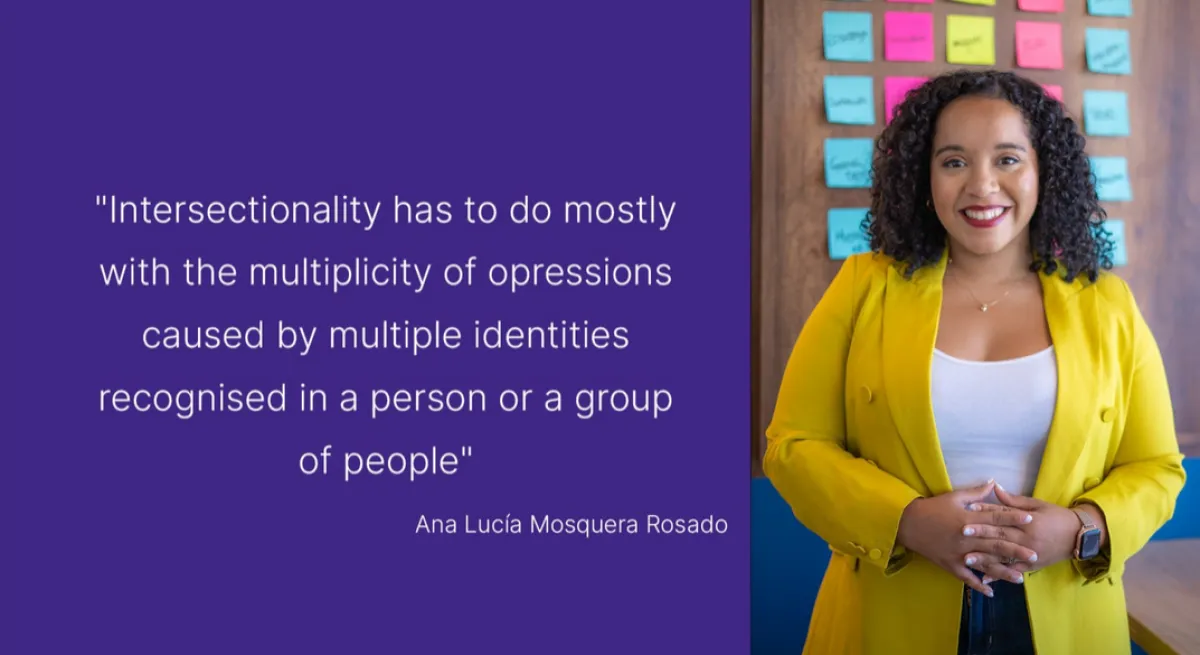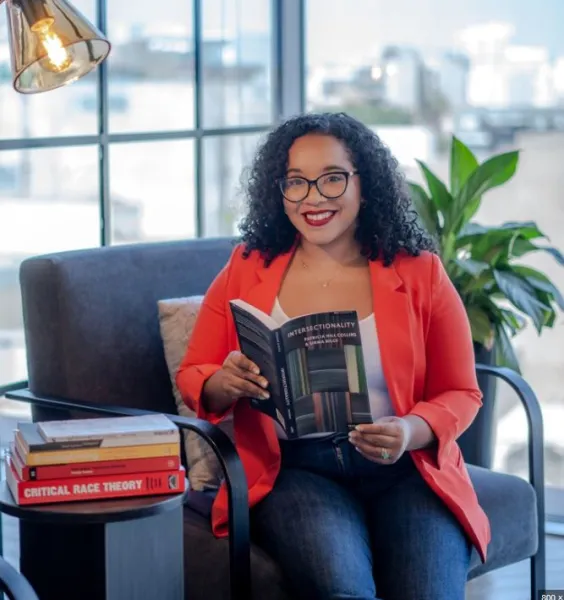
We delve into the captivating realm of intersectionality, where the threads of identity, privilege, and social dynamics intricately weave together. We interviewed Professor Ana Lucía Mosquera Rosado, she is a researcher, activist, university lecturer and comunicator. Throughout her career, she has been a public servant and an independent consultant specializing in matters related to ethnic-cultural diversity, racial discrimination, intersectionality, inclusion and gender equality, and in the elaboration of communication strategies with an intercultural focus. Her work has been published in Peru, Spain, and the United States.
Interview with Prof. Ana Lucía Mosquera Rosado
Prof. Mosquera, what does intersectionality mean and why is it such an important term today?
The first thing I would like to say is that intersectionality is a term that has been used since the late 1980s and early 1990s but has become more popular in the last 20 years or so. Intersectionality was created and developed as a theoretical framework, mostly by black women who understood from the very beginning that there was more than one type of oppression experienced at a time. Intersectionality is about a lot of things and is often confused with the sole recognition of multiple identities. But what it does for the understanding of inequalities as a theoretical framework is that it gives us the possibility to look at the multiplicity of experiences of discrimination, marginalisation, and oppression that one person can be suffering at the same time, and that will make their life experience more complex. There is no short definition of intersectionality, but I would say it has to do mostly with the multiplicity of oppressions caused by multiple identities recognised in a person or a group of people.

Why is there a kind of synergy when talking about inequality and discrimination?
It is impossible for me to think about inequality without talking about discrimination. Discrimination has to do with the visible actions that lead to the exclusion and marginalisation of people, thus perpetuating and reproducing inequalities. And although many people believe discrimination is only to do with an individual issue or situations that are not permanent, the experiences of discrimination that affect marginalised groups are often permanent and continuous. Discrimination has to do with less access to opportunities, a limited exercise of rights, and the impossibility to access public services or spaces. When a person cannot have access to all these possibilities, that person is not living in equal conditions as others. And since the two of them are naturally related, people that experience inequalities are all subjected to severe forms of discrimination in society.
How can we as individuals make an impact on reducing inequality and discrimination? How can companies respond to the problems of inequality in society?
Inequality and discrimination are systemic issues, and that means they are bigger than all of us, because they are rooted in the foundations of our societies. That does not mean, however, that there is no individual action we can take to solve a collective issue, and as simple as it may sound, by having the will and the purpose to put these topics out for discussion. Being able to question inequalities and put forward arguments that would help to reveal that these are issues that are build and reproduced under the surface makes a difference in how people perceive an unequal society. The other thing we can do is to understand that inequalities are also about privileges, and in some way many of us have privileges compared to other people. Acknowledging privilege will allow us to realise that there is so much more we can do with our privilege and that we need to take accountability for the things that we might not have created but put us in a position of advantage in relation to other people.
Could you provide examples of how specific marginalised communities are disproportionately impacted by wealth inequality due to intersecting factors?
Yes. When I started to develop an interest in intersectionality, while I was gathering information for my TedxTalk, I took a closer look at the data on Peru to see how intersectionality affected the multiple inequalities that we have. One of the things that surprised me the most was how ethnicity, gender, disability, and sometimes geographical location affect and create a wider gap in issues like literacy, for example. In Peru, we all know that women have lower levels of literacy than men, and that should make us concerned. But when we take a more detailed look at the numbers, we discover that women with a disability are way behind in their levels of literacy, that black women are way behind in their levels of literacy, that indigenous women are also way behind the national average; and if we add another axis to the analysis, the gap just keeps getting wider and wider. As I’ve always been concerned with education that number surprised me and made me realise that reducing the national average should not be the sole purpose of the job that we do, because it will get better, but there will still be a gap. And we all know by now that education is one of the main factors in social mobility. So, literacy, school and university attendance are things that should not be seen as a single problem that is marked by gender or ethnicity or age, but from its intersecting factors.
What role does access to education and employment opportunities play in the intersectionality of wealth inequality?
Nelson Mandela said that education was a powerful tool on the path to success. Investing in education, but more specifically investing in education for underrepresented groups, is extremely important to end inequalities. And I agree with that, but education is not the only thing that will help us to end inequalities in society. There need to be actions to guarantee that people from marginalised communities get the education they deserve and that they also have access to the job market without discrimination. There are several studies that prove how bias impacts the hiring decisions of employers, and as long as biases continue to affect our chances of accessing proper jobs, there is no guarantee that education will get us out of poverty or marginalisation. What we really need is to not only focus on guaranteeing education for everyone, but also on ensuring that there is an environment that is ready and willing to diversify so as to include everyone.

Communicator, university lecturer, activist and researcher, specializing in matters related to diversity, interculturality, gender and non-discrimination. She has a degree in Communications from the University of San Martín de Porres, a Master’s in Latin and Caribbean Studies, a Master’s in Liberal Arts from the University of South Florida and took a diploma in Afro-Latin American Studies from the Afro-Latin American Research Institute at the Hutchins Center, University of Harvard. She is a Certified Diversity and Inclusion professional by the University of Georgia.
Throughout her career, she has been a public servant and an independent consultant specializing in matters related to ethnic-cultural diversity, racial discrimination, intersectionality, inclusion and gender equality; and in the elaboration of communication strategies with an intercultural focus. Her work has been published in Peru, Spain and the United States.
She is also a member of the Executive Board of Makungu para el Desarrollo and La Morada, and is vice-president of Afro-Latin/American Research Association (ALARA). She is a 2020 Fellow of the Programme for people of African descent at the Office of the High Commissioner for Human Rights of the United Nations. She was part of TEDxTukuy Women 2020 with the talk "The importance of intersectionality”.

Susan Hermann is the responsible digital marketing and communications specialist for the Wealth Inequality Initiative.
Susan has more than 10 years of experience in digital communication and marketing in Peru, Spain and Switzerland. She has a master's degree in International Marketing and Business Management from the Rey Juan Carlos University and the EAE Business School in Madrid, Spain. In recent years, she has held specialized marketing positions in Switzerland, her main role being to generate a positive impact on organizations by taking her to the world of philanthropy and Foundations.
Hand in hand with the Wealth Inequality Initiative, Susan seeks to generate an impact on the reduction of inequalities and identify the community factor to generate a thought of change makers.
About COES

The Wealth Inequality Initiative Glossary aims to demystify terms linked to the global challenge of wealth inequality. Understanding these terms is the basis for understanding the issue itself and why it matters to all.
Take the chance to learn more and join our shared effort to reduce wealth inequality.
Did you enjoy this exchange?
If you are a researcher or specialist in inequality reduction issues, write to us and let's talk.
